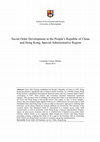Papers by Leopolda Contaux-Bellina

Since Mao Zedong established the People’s Republic of China in 1949, Hong Kong has played a signi... more Since Mao Zedong established the People’s Republic of China in 1949, Hong Kong has played a significant role in China's closed economy. As a British colony, Hong Kong became a prominent international financial centre and was returned under China's sovereignty in 1997. Their polities and economies therefore underwent significant changes. This research seeks to challenge the notion that China is an authoritarian state at all levels and Hong Kong a free-market haven. The reality, in fact, is more complex. Hence, this case-oriented study applies North et al.'s (2009) theory of social order to both Mainland China and Hong Kong. It aims to offer an alternative approach to defining both territories’ social orders, which are strongly different yet interwoven. The outcome of the research shows that Mainland China is entrenched in a limited access order, both economically as well as politically, while Hong Kong, a Special Administrative Region, enjoys an open access economy, and yet is confined into a limited access polity under Chinese control. North et al.'s approach offers insight into China's and Hong Kong’s prevailing systems, enabling this study to fill a gap in the literature; that is, examining both China's and Hong Kong’s accesses to economy and polity simultaneously.








Uploads
Papers by Leopolda Contaux-Bellina